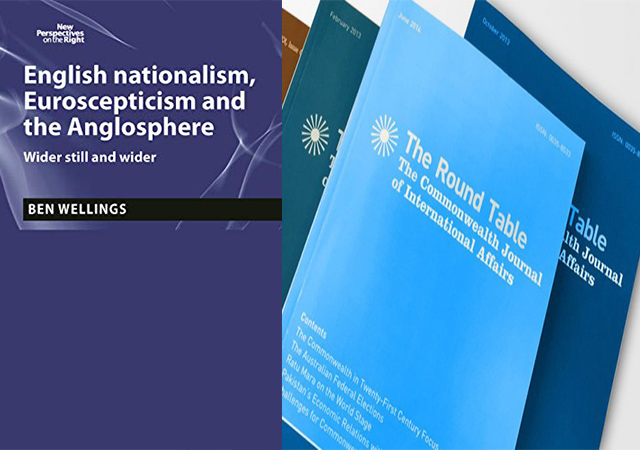
[This is an excerpt from a book review appearing in the current edition of The Round Table: The International Journal of Commonwealth Affairs.]
This book is very well informed theoretically and historically, as well as with its analysis of the underpinnings of the contemporary Brexit phenomenon from the perspective of the leading advocates for Leave. It explains very clearly how ‘England’ is so often conflated with ‘Britain’ (England and Wales, and Scotland) and indeed the entire ‘United Kingdom’ (of Great Britain and Northern Ireland). From a theoretical perspective English nationalism has often been characterised as ‘absent’, following neither the secessionist model (Scotland) nor the integrative republican model (France). Wellings refers to the argument of Krishan Kumar that England is ‘a nation at the core of a post-imperial state’, bearing resemblance in this respect to Russia, Austria and Turkey (p. 50).
Part II of the book is particularly important in showing how the three broad historical memories linking England (Britain?) to the wider world, and the Anglosphere in particular, are central to the imagination of English nationalism. This imagination combines defiance towards a hostile world with a view that England/Britain has contributed inordinately towards bettering that world. In relation to the ‘three pillars’ there are plenty of alternative interpretations. One could argue that representative democracy, as distinct from responsible government, was slow coming to the United Kingdom, with an equal franchise for men and women only being achieved in 1930. There is the counter argument also in relation to the British Empire (for example, Shashi Tharoor, Inglorious Empire: What the British Did to India, and post-colonial interpretations more generally). Historians such as Richard Evans and Christopher Clark (The Sleepwalkers: How Europe went to war in 1914) have contested the official version of 1914, while ‘finest hour’ was preceded by highly conflictual politics in Westminster in 1940. The eventual outcome of World War II was primarily determined by the intervention of the Soviet Union and the United States from 1941.
Although Wellings focuses on the historical imagination of English nationalism, there exist alternative historical narratives relating to the location of England and Britain as part of Europe. While undoubtedly challenged by nativists, these narratives might include the impact of Roman rule (responding positively to Monty Python’s ‘What have the Romans ever done for us?’), the spread of Christianity, conquest by the Normans, and interaction with broader European movements such as the Renaissance, the Reformation and the Enlightenment. In relation to wars before the twentieth century, England (or post-1707 Britain to be more precise) was frequently adept as a player in the European balance of power, often allying with like-minded states (for example in the eighteenth and nineteenth centuries, the Seven Years’ War of 1756–63 and the Napoleonic Wars). The Glorious Revolution of 1688–89, a landmark in England’s constitutional development (not to mention that of Scotland), involved continental Europe in the form of the invitation to William of Orange and Mary to become joint constitutional monarchs. Linking the historical narrative to the contemporary era, it is entirely possible to highlight the cosmopolitan aspects of English and British history, including the welcoming of refugee groups who have contributed immeasurably to English/British society. The narrow version of British sovereignty can be countered with an argument about the importance of international cooperation in dealing with the complex issues of the contemporary world.
As argued in the book the predominant focus for the Brexiteers, based on their perception of English nationalism, is that of Global Britain, emphasising the Anglosphere. This is not an isolationist perspective, but involves prioritising the English-speaking world to which the United Kingdom is politically and culturally linked. The most important country in the Anglosphere is the United States, but the term extends to include the ‘Old Dominions’ of Canada, Australia and New Zealand. Most commentary on this issue argues that the Anglosphere, even if favourable trade agreements were concluded, would not be a substitute for the loss of markets in the European Union under a hard Brexit. In the Australian case, with which I am most familiar, Australian governments post-2016 have indicated a willingness to conclude a free trade agreement with the United Kingdom should the circumstances be propitious. However, schemes for the free movement of people between the two countries (as earlier proposed by Boris Johnson) would be more problematic. Political leaders on the Australian right, such as former prime ministers John Howard and Tony Abbott, use Anglosphere terminology, but in mainstream Australian politics the focus is on the United Kingdom as a significant international partner, with many overlapping economic, political and security interests; shared political values; intersecting histories and cultures; and people-to-people links. However, there is also a strong nationalist element in contemporary Australian politics, leading to ‘Anglo-scepticism’ (p. 164). This scepticism is influenced by the increasing proportion of the population of non-British background (including over 10.0 per cent Asian ancestry according to the 2016 census, with perhaps two thirds of British and Irish ancestry), and a push to redress the grievances of the indigenous population. The days when Australian prime ministers such as Alfred Deakin and Billy Hughes (in the early decades of federation), and even Labor’s John Curtin (in 1944), could aspire to an equal partnership between Britain and the Dominions in the British Empire/Commonwealth are long gone.
Derek McDougall is with the School of Social and Political Sciences, University of Melbourne, Australia.
English Nationalism, Brexit and the Anglosphere: Wider Still and Wider by Ben Wellings, Manchester, Manchester University Press, 2019.



